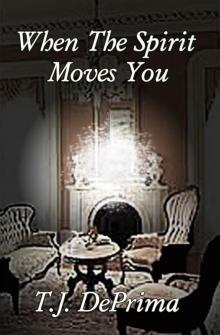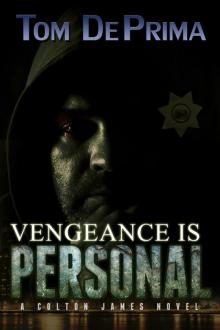- Home
- Thomas DePrima
When The Spirit Moves You Page 10
When The Spirit Moves You Read online
Page 10
Roberta said, "So what are you saying? That we're here because she was grieving for her dead friends?"
"I'm trying to say that the spirit from the future may have pulled us here and put our life force into these bodies in an effort to save his daughter's life. Look at it this way; the four girls are already near death from being stuck out in the storm by the time their bodies are found, and pass away on the trip to the mansion. There's nothing that the ghost can do to restore them because their spirits departed their bodies while he was still alive in 1883. So after he passes away, he refuses to cross over to the spirit world. Instead he remains at the mansion, just waiting for four young girls to wander in. Perhaps he wanted four girls who were about nineteen, and unmarried, but after waiting more than a century, he decided that we'd fit the bill well enough.
"So he contrives to corner us in the front hallway of the mansion, the same place where the bodies of the girls were carried in. After appropriating our life force, he pulls us back through time and sticks our life forces inside these bodies. Remember how bitterly cold it was when we entered these bodies? The girls then apparently come back to life, so to speak, without any apparent sign of injury or harm. A human dies of cold when the body's core temperature drops below a certain point. I believe that can happen without frostbite occurring, but if that's incorrect, then he must have been able to erase all signs of tissue damage when he reanimated the bodies. Anne might have been just as grief-stricken if we'd had to have pieces of our bodies, such as fingers, toes, ears, or more, amputated. With us here, and healthy, the party can go on, Anne can announce her engagement, and the happy couple will live happily ever after. Afterwards, the four friends return to their lives elsewhere."
"So how do we get back home?" Roberta asked.
"Once these bodies are no longer needed for Anne's well being, the ghost may return our life force to our own bodies, if they're still alive."
"Still alive?" Elizabeth gasped.
"We don't know if our bodies can survive without a life force, so we don't know what happened to them after we were pulled out. They could have died instantly. I have an unshakable image in my head of them lying crumpled atop one another in the entrance hallway of a long deserted mansion."
"But surely someone will find them," Roberta said.
"Perhaps, but judging from the number of cobwebs we destroyed, it seems as if no one had been inside the mansion for some time. The security patrol probably just walks around outside the house." A thought suddenly occurred to Amelia. "Did we leave the terrace doors open in the ballroom?"
"I think so," Martha said. "At least I don't remember closing them."
"No, I closed them after I got the stick for the cobwebs," Elizabeth said. When everyone turned to look at her, she said defensively, "Well, I'm sorry. I didn't know I should leave them open, and I didn't want anyone who might be checking the house to see them open."
"It's okay, Elizabeth," Amelia said comfortingly. "None of us knew it would be important. But unless a strong wind comes up, strong enough to open the doors, the security guards aren't going to see them ajar, won't investigate, and won't find our bodies. That is, if the guards even actually walk around the house instead of just driving around the perimeter road inside the wall."
"If our bodies have already died, there's nothing to go back to," Roberta said. "We'd be better off staying here. At least we can live out the lives of these bodies."
"How can we determine if we have bodies to go back to?" Elizabeth asked.
"I don't know," Amelia said. "We might be able to find out by making contact with someone who's already crossed over in this time."
"Another séance?" Roberta asked. "You want us to get involved with more spirits? How can you even suggest that? Next time we might wind up in the post-American Revolution days instead of the post-Civil War period. At least here we have indoor plumbing. I vote no."
"The alternative is to just remain here and pray for the best. We can hope that our bodies are still alive, and hope that the spirit will put us back where we belong when it's done with us."
"How long will that be?" Elizabeth asked.
"Certainly not before the engagement party is over next Sunday."
"If our bodies remained alive after we were pulled out, they should still be available for us to return to after nine days. I've heard of earthquake victims that were buried in rubble for longer than that and survived."
"Of course the ghost may want these bodies to stay for their entire scheduled visit. He wouldn't want them to expire here, or have Anne feel responsible for our deaths in any way after going to so much trouble to bring us here. It would be far better for his purposes if they were to die in their own homes."
Martha sucked in her breath sharply. "He's going to kill us?!"
"If he puts us back where we belong, these bodies will die, again, unless he finds other life forces to put into them. After all, their original owners have already departed."
"You're talking like they're vacant houses," Elizabeth said.
"In a way, that's exactly as I think of them. And right now we're locked inside and the spirit has the only key that we know of."
"That's a skeleton key, I suppose," Roberta quipped. Then getting serious she said, "If we remain here for more than a couple of weeks, our other bodies will have expired, unless they're found and brought to the hospital."
"The spirit may even want us to stay in this time period until the wedding ceremony is over," Amelia said, "and upon further reflection, I think that's highly likely. Like any good father, he'll want his little girl to be happy, as much as possible."
"Then there's no chance of our getting back in time to save our bodies?"
"I don't know, Roberta. This is January. Engagements during this era could be quite long. Possibly as long as 5 years—"
"5 YEARS?" Martha exclaimed.
"Calm down, I hadn't finished. Since there are already bridesmaid dresses hanging in our wardrobe closets, I would say that the wedding is not too far off; possibly as early as April, but more likely it will be in May or June. Those months seem to be the most popular for marriage in New England because of weather and other factors. If the ghost had a plan for having someone find our bodies so they can be taken to a hospital, we still might be able to go back. It was able to close and lock doors, so it should be able to open them as well, and do something to signal for help."
"Our bodies can't survive for six months without us in them," Elizabeth said.
"Of course they can, if they're still alive now. They'll hook them up for intravenous feedings, like they do for comatose patients."
"But comatose patients still have their souls, or their life force as you called it," Roberta said. "Our bodies don't have a life force to sustain them."
"But it was only our consciousness that was pulled out," Amelia retorted. "Our physical brains are still in the bodies. That might be enough for machine-dependant life."
"You mean that we may still be able to go home, Amelia, even if the ghost keeps us here for six months?" Martha asked.
"Yes, or possibly longer. But there's no way that we can learn the intentions from the spirit that brought us here. He's still among the living in this time era, so if we approach Mr. Westfield with this analysis, he'll think that we're totally insane. And I already told you what they do with crazy people in 1883. Some of the insane asylums were the most horrible places that you could imagine. They were— are, like the awful stories that you hear about prisons from medieval times. They lock an iron collar around your neck and chain you to the wall. You stay sitting in your own filth until they get in a mood to clean you. Male, female, child, it makes no difference. I found drawings and sketches by a nineteenth century asylum patient when I prepared a paper for a history class project a couple of years ago. I haven't been able to get the terrible images out of my mind since. I will NOT wind up in one, even if I had to denounce anyone who spread our story around. So if word of our situation leaks beyond this g
roup, you're on your own."
"I don't believe that you would ever desert us," Roberta said.
"I would never desert you. But it would do no good to corroborate the story of a 'crazy' person. By remaining on the outside of the institution, I can do much more to effect your release. You're my best friends, and I'll stick by your side through anything, except going to an asylum with you as a fellow patient. I hope that I've impressed upon you the importance of keeping our little situation strictly among ourselves. Do not tell anyone. If you slip up with a reference to future events or inventions, shut up. Don't compound the problem by trying to talk your way out of it. Remember that you're women in 1883. You can be stupid and ditzy, and no man in this age will give it a second thought, but if they think that you are mentally unbalanced, that is another matter entirely."
When Martha started to sob, Amelia asked gently, "What's wrong, Martha?"
"I just realized that by the time that we get back, everyone might have forgotten about us."
"Oh Martha, our families won't have forgotten about us, dear. And in the meantime we'll get to experience things that other people can only dream about. Hopefully, if we can get back, we'll be able to take the memories with us. But even if we forget everything, so what."
"I could certainly live without the daily experience of wearing a corset, bustle, half a dozen petticoats, and floor length gowns," Roberta said. "Not to mention being treated like the scarecrow from the Wizard of Oz." Posing with a goofy look on her face, she said, "Look at me, I'm a woman so I naturally have no brain." Becoming serious again, she said, "I want to go home as soon as possible, if that is possible."
"The corset's not so bad," Amelia said. "I actually feel better when I'm wearing it; it's like a back brace. I'd like to see the bustle go, because from in back we all appear to be riding small ponies; but since you can't recline properly while wearing a corset anyway, I can live with it. The rest of the clothes are helping to keep me warm and comfortable, but I don't know how it's going to be come summer, when the dog days arrive. The long skirts do eliminate the problem of always having to cross your legs or hold your knees tightly together to protect your modesty. So all things considered, it's not so bad. As far as the brain thing goes, it'll be up to us to show them that women do have a brain, and that we're not afraid to use it."
"So we have to choose between having a séance or waiting to see if the spirit just puts us back where we belong?" Roberta asked. "Some choice! What happens if it just doesn't want to put us back?"
"Then I guess we learn to live here and like it, or at least suffer in silence while we continue to look for a way back on our own. I don't see any other alternative right now. And there are definitely some benefits to being dropped into this particular time."
"What possible benefits could there be?" Elizabeth asked. "We're at the mercy of every man in the country; correction, every man in the world."
"There are some problems, I admit that, but we can work around them. Right now, the world is on the verge of a giant step forward in technological evolution. In this time, people haven't yet seriously harmed the environment, so the air outside of factory towns is still clean and pure, much of the country is unspoiled wilderness, and we don't have to worry about terrorists, or anyone else for that matter, using nuclear weapons. We also have a distinct advantage over everyone else; we know what history has in store for our country, and the world, for the next 120 plus years. Maybe we don't know the exact dates for everything, but we can use what we do know to make decent lives for ourselves. And when women get the right to vote, by constitutional amendment in 1920, we'll be able to make our voices heard publicly."
"How is knowing history going to make decent lives for us?"
"We know what companies and products are going to make it big. For example, we know that in the not too distant future, automobiles are going to appear in great numbers. We know which auto-makers are going to make it, and therefore which will fail. We know that the Wright brothers are going to have the first successful, powered controlled flight in 1903, and that World War One will start around 1914. We know about prohibition, the stock market collapse in 1929, the Nazi invasion of Poland in 1939, and on and on and on. If we're stuck here, we can use our knowledge to make a decent life for ourselves."
"But won't that alter history?"
"I don't see how that can be avoided. Our mere presence here has already altered history to some extent since the four girls we're replacing were supposed to die. And we didn't ask to be brought here, so our first loyalty must be to ourselves. I'll use whatever knowledge I have to survive, and to see that you all survive. You, my sisters, are my family now— my only family in this time period. We cannot contact any of our real ancestors for the same reason that we can't tell anyone in this house what has happened to us. We're on our own, and we must work together to ensure our futures in this past."
Elizabeth said stoically, "Then we're like the four Musketeers, one for all…"
"And all for one," the others chorused, just before breaking into giggles.
With their council completed, the girls hurried to change into their ball gowns.
Each evening prior to dinner, the family and their guests would assemble in the drawing room closest to the formal dining room to await announcement that the meal was ready to be served. On this night a roaring fire blazed and crackled in the room's White Carrara Marble fireplace, making the gathering location pleasantly comfortable. Wall mounted gas lamps and a chandelier filled with candles brilliantly illuminated the room.
The women, striking in their resplendent ball gowns, chatted gaily on chairs, settees, and ottomans, while the men, dignified in their dark suits, stood and conversed in small groups. Several of the men could usually be found congregating near a table in the corner that contained alcoholic beverages in crystal decanters. Nothing stimulates the appetite like an aperitif or two.
Upon their arrival, Amelia and her friends joined Anne, Beverly, and Patricia, who had taken seats on a clutch of ottomans in the corner opposite the beverage table. Amelia was aware of the steadfast gaze that Jeremy Westfield was casting in her direction, but she kept her eyes averted. It would not have been proper to acknowledge him, it being considered flirtatious to lock eyes with a man not in your conversation sphere, for even a second.
When dinner was announced, the assemblage began to pair up for the walk into the dining room. Mr. Westfield would escort Anne, since her fiancé had not arrived yet and she was the acting Mistress of the house. Amelia suddenly found herself confronted by Jeremy Westfield, his elbow extended to accept her arm. She smiled politely, slipped her arm through his, and allowed herself to be led to a position in line behind his father and Anne. Everyone else paired up behind them, and since there were a few more girls than boys, a couple of the men had a woman on each arm.
Once everyone was ready, Mr. Westfield led the way to the dining room. Jeremy escorted Amelia to a seat and held her chair while she arranged her skirts and sat down.
"I haven't yet thanked you," Amelia said after Jeremy had taken his seat, "for saving my life, and those of my companions. Thank you, Mr. Westfield."
"It was my very great honor, Miss Turner, to be among the fortunate group that discovered your carriage. At the time, I feared we were too late. As I cradled you in my arms for the return trip to the house, your hands and face were as cold as ice. I had already reconciled myself to your fate, and was trying to determine how best to apprise my sister of the dreadful news when, upon entering the house, you suddenly stirred. If you hadn't beaten me to it by suddenly screaming and then fainting again, I surely would have swooned myself. I was gratefully spared that inglorious embarrassment only because I was required to stay alert and carry you to your room."
Amelia giggled. "I wish I had been awake to see your face."
"I'm rather glad you weren't. I'm sure it was not a pretty sight; and would certainly never be so pleasing to gaze upon as your own handsome countenance."
"Mr. Westfield, please, we've only just met."
"I feel as if I've known you forever, Miss Turner. I hope that we can become good friends. Will you do me the honor of permitting me to be your escort for the dance tonight?"
"Yes, Mr. Westfield," Amelia said, almost without hesitation.
"Thank you. I look forward to our first dance together."
Amelia swallowed the small lump that had suddenly materialized in her throat. She knew little about the dances of the period, so she decided that she had better change the subject. "Tell me about your college. Have you enjoyed your years at school?"
Throughout dinner, Jeremy proved to be a most capable conversationalist and she was able to learn about his college experiences and his plans for the future. As the son of a wealthy man, along with dashing good looks and an excellent education, his future was a bright one. Following graduation in June, he would enter the family shipping business, where a vice-presidency was waiting for him. He had the world by the tail, and he knew it.
The men remained behind in the dining room after dinner, to talk business and politics as they enjoyed a cigar and brandy, while the women excused themselves and withdrew to a parlor near the ballroom. Amelia had never liked cigar smoke but she knew that she'd have to tolerate it somewhat if she was to fit in here. No unmarried woman of this period would dare complain openly about the awful smell; not if she expected to find a husband. Such topics of dissension were normally reserved for after the nuptials.
As the others talked, Amelia walked to the window and smiled, delighted to see that the storm was finally abating. Though the wind continued to bluster and howl mightily through trees long naked of any leaves, the snow had finally stopped falling. A fine powder, drifting on the wind, insured that drives and walkways would be covered again tomorrow morning.
"Amelia?" she heard at her side, and turned her head slightly to see Anne standing there.
"It's stopped snowing," Amelia said, turning her head to gaze out the window again.

 Milor!
Milor! New Title 1
New Title 1 Return to Dakistee (A Galaxy Unknown, Book 8)
Return to Dakistee (A Galaxy Unknown, Book 8) The Invasion Begins
The Invasion Begins When the Spirit Calls (When the Spirit... series - Book 2)
When the Spirit Calls (When the Spirit... series - Book 2) Changing of the Guard (A Galaxy Unknown - Book 11)
Changing of the Guard (A Galaxy Unknown - Book 11) When The Spirit Moves You
When The Spirit Moves You Castle Vroman
Castle Vroman Clidepp Deja Vu
Clidepp Deja Vu Vengeance Is Personal (A Colton James Novel, Book 2)
Vengeance Is Personal (A Colton James Novel, Book 2) Retreat and Adapt
Retreat and Adapt Return to Dakistee
Return to Dakistee A Galaxy Unknown
A Galaxy Unknown